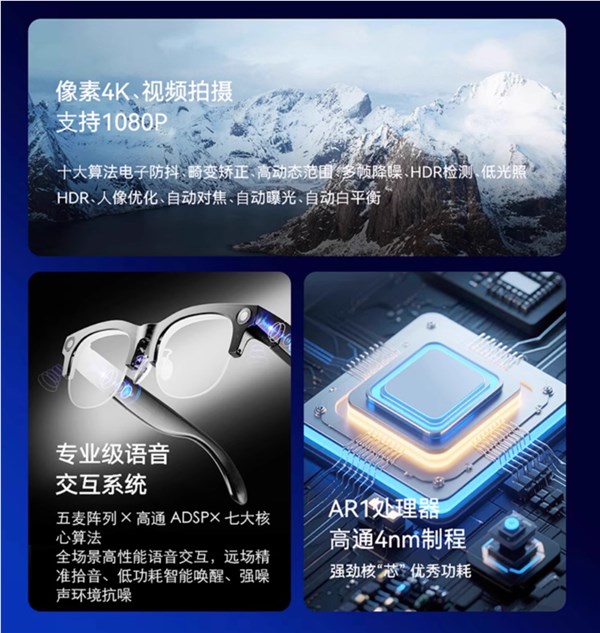China Telecom has officially launched its first smart glasses - Tianyi AI Smart Glasses, priced at 1999 yuan, entering the consumer electronics market with a lightweight design and multifunctional integration. The product adopts an ultra-light semi-frame structure, with a total weight of only 38 grams, combined with an adjustable nose bridge and elastic temples that can expand up to 15 degrees, making it adaptable to different face shapes. Its 8-degree ergonomic forward tilt design aims to reduce visual fatigue during prolonged wear.

Core specifications include the Qualcomm Snapdragon AR1 chip, 2GB of memory, and 32GB of storage space. It supports 12 million pixel ultra-wide angle lens to record 1440P resolution videos at 30 frames per second, and integrates EIS electronic image stabilization, LDC distortion correction, and HDR image optimization technology. The audio system uses an open custom acoustic chamber and intelligent tuning technology, achieving accurate voice activation in noisy environments through a 5-microphone array and noise reduction algorithms, while also offering private anti-leakage sound function.
The product is equipped with China Telecom's independently developed Tianyi Xingchen large model, providing scenario-based functions such as intelligent object recognition, text recognition, food nutritional analysis, and automatic exhibition interpretation, and supports voice control and real-time bilingual translation between Chinese and English. In terms of battery life, a single charge provides 7 hours of continuous use, and with a 3000mAh charging box, it can complete 10 full charge cycles, supporting 40-minute fast charging. Official data shows that the audio playback time is up to 4 hours, and in Bluetooth mode, it can be used continuously for 200 minutes, with a video recording time of 35 minutes.
As the operator's first self-branded smart glasses, Tianyi AI Smart Glasses aim to establish a differentiated competitiveness in the sub-2000 yuan market through deep integration of hardware and AI services. Its functions cover multiple scenarios such as daily office work, cultural tourism, and health management, providing users with an intelligent interaction experience.










